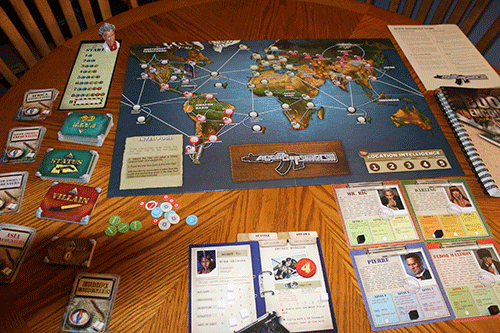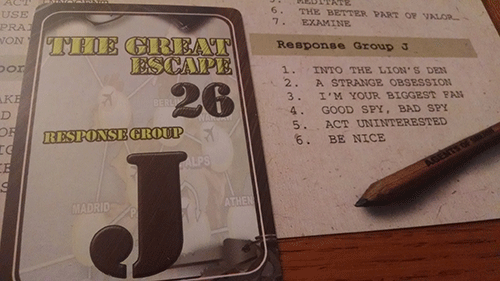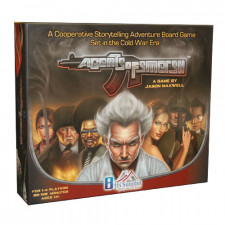Agents of SMERSH (2nd Edition) Review
on Oct 6, 2016
Tales of the Arabian Nights is one of the greatest games of all time, and it’s hardly even a game. It’s essentially a collection of wildly different, paragraph-length stories that the game randomly selects for you, weaving a tale that allows your friends to laugh at your terrible misfortune—or become envious over your great fame and fortune.
Agents of SMERSH unabashedly borrows this format, but attempts to graft on some kind of an actual, overarching structure to the storytelling madness. It’s also cooperative, with players taking on the roles of campy Cold War-era super-spies attempting to stop a sinister worldwide organization from achieving its dastardly ends.

The historically accurate, topsy-turvy world of the ‘60s.
There is definitely more of a “point†to SMERSH than other storytelling games. There are very light strategic choices for players to make, though the design isn’t terribly unique for a cooperative game. It’s in the same vein as Pandemic or any of its successors, wherein players are tasked with running around a map and putting fires out before the time runs out. Move your pawn, have an encounter, then bad stuff happens—it’s as simple as that, with very little variation on the typical formula.
But these kinds of games aren’t really about winning or losing, though SMERSH makes a valiant effort to make you care about that sort of thing. They’re about the story that you weave while you sit around and read zany event paragraphs to your friends.
Unfortunately, the key mechanism of the game that made Tales so much fun, the encounter-reaction-event chain that generates each unique event in your story, is so poorly designed that all the life of Tales is sucked right out of this take on the same idea. I don’t know how the designers managed to botch this element so bad, but it ruined the game for me.
Let me paint you a picture of what it’s like to have an encounter in Agents of Smersh: first, you draw a card corresponding to the region that you’re in. The card says something nonsensical like “THE GREAT ESCAPE†followed by a letter. The letter then points you to a list of equally nonsensical reactions, like “I’M YOUR BIGGEST FAN†or “A STRANGE OBSESSION†or “INTO THE LION’S DEN.†What do these things mean? Am I supposed to know what my character is doing when I choose the “GOOD SPY, BAD SPY†option? It’s a horrible bit of design that robs the system of any fun.

What.
So there’s the first problem: the events and corresponding reactions make absolutely no sense. The whole fun in Tales was that you encountered something like a mysterious djinn, and decided to taunt it, or attack it, and end up getting maimed or turned into a donkey as a result. Here, I’m given an incredibly vague phrase and am forced to respond with an equally vague menu of options, and therefore I never feel a sense of connection with the stories or my character.
Then, after adding an additional randomizer from a card deck, you flip to an encounter in the hefty storybook, and read an encounter that’s supposed to take into account both the card you drew and your response. The trouble is, it often has nothing to do with your choice.
To compound the issue, the stories are written poorly, to the point where they’re painful to read. The paragraphs will begin without giving the reader any context regarding where they’re at or why they find themselves in a dusty hotel room, and then it’s as if the writer suddenly remembered where you’re supposed to be and tacks some important context on as an aside.
After this exercise in frustration and confusion, you roll some dice with a decent little success/fail push-your-luck system. It works fine for its purposes, though a simpler system would have been alright as well. So at least that element isn’t broken beyond repair.
I really wanted to like Agents of SMERSH. Storytelling games, especially with relatively untapped themes, are right up my alley. Yet SMERSH falls short, primarily due to its asinine implementation of the paragraph-driven gameplay. It’s a real shame too, because with some more attention and care paid to this aspect of the game, it would have been one of my favorites.
But as it stands, I can’t really recommend the game to anyone.

 Customer Support
Customer Support  Subscribe
Subscribe 




 Account
Account  Wishlist
Wishlist 

